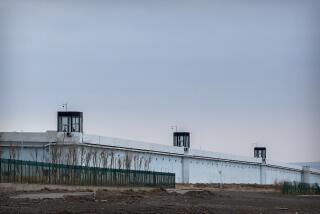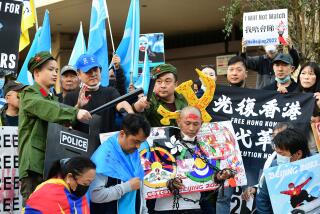16 killed as Chinese police clash with Uighurs
- Share via
BEIJING -- Sixteen people were killed in a clash between Chinese police and ethnic Uighurs near the far western city of Kashgar, one of a string of similar incidents in the ethnically divided region.
The regional government’s website said police were trying to make arrests at 11 p.m. local time Sunday when they were attacked by people who “threw explosive devices and wielded knives.’’
“The police dealt with it decisively and shot 14 thugs to death,’’ Tianshannet, the website of the Xinjiang region, reported. Two policemen were also killed.
China’s Foreign Ministry portrayed the incident in Shufu county, about 12 miles west of Kashgar, as another in a series of terrorist attacks by the Uighurs, who are a mostly Muslim ethnic minority more closely related to the Turks than the Chinese.
“It once again showed the true face of violent terror. It should be condemned by all people who love peace and stability,’’ said spokeswoman Hua Hunying.
Dilxat Rexit, a spokesman based in Sweden for the World Uyghur Congress, disputed the Chinese government’s account and said the clash broke out when the Peoples’ Armed Police, a paramilitary group, went to break up a gathering of Uighurs at a home.
“The local government is opposed to Uighurs gathering,’’ Rexit said. “The government at least used to arrest Uighurs and put them on trial and they had some chance of surviving. Now it’s obvious -- they just shoot them on the spot.”
Tensions have been unusually high this year, especially in recent months, after an incident in October in which a Uighur family drove a car into Tiananmen Square and set themselves on fire. In mid-November, 11 people were killed in Bachu county, also near Kashgar.
In the Xinjiang region, Uighurs complain of discrimination in employment and housing and about unfair restrictions on practicing Islam. Many of the efforts have been centered around Kashgar, an ancient Silk Road oasis, when the local government earlier this year launched a campaign known as “Project Beauty” to discourage women from covering their heads with a veil.
barbara.demick@latimes.com
More to Read
Sign up for Essential California
The most important California stories and recommendations in your inbox every morning.
You may occasionally receive promotional content from the Los Angeles Times.













